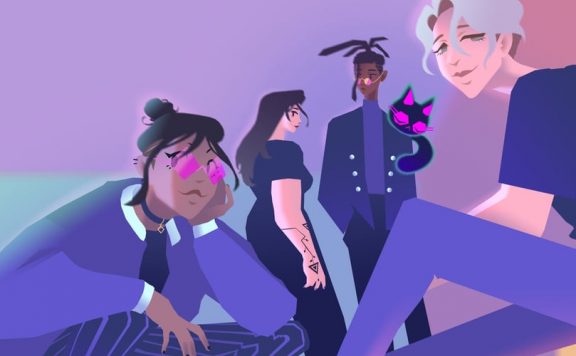What is zeitgeist? It’s a question that We Are OFK finds itself answering through every moment of its LA-set, Gen-Z-starring musical narrative. Part EP, part animated music biopic, part visual novel, it redraws the lines again as to what gaming is, while raising other questions about art and interactivity. Wherever you place it though, We Are OFK is sharp, relevant, and it sounds absolutely amazing.
Following the lives of four creatives in LA, you’re introduced to Luca, a video game narrative writer, Itsumi, a pianist who’s also stuck in the same developer office, Jey, a music producer, and Carter, a visual designer for live shows. We Are OFK chronicles their coming together as a musical group while embedding you in their lives, filled with romance, work and friendship – the timeless, and wholly relatable, experiences they’re making their way through.
We Are OFK is a true Gen-Z tale, with much of the character interaction playing out via messaging apps that you can swerve in the direction you want. It doesn’t alter the outcome, but you can frame the characters in a way that feels more authentic to you. There’s five episodes in total, tied to five tracks, and for the majority of time your input is through these text missives. You’ll otherwise be watching the narrative play out in front of you, and it’s fortunate that there are a number of reasons for you to stay tuned in.
Firstly, I found the central characters increasingly likeable. They’re all dealing with ‘stuff’, and it’s the stuff that we all have to deal with: overbearing parents, sexuality, relationships, work. Luca is an utter flake, but you feel as though he gets a pass after losing his job and being utterly wrapped up in finding love. It’s his songs that the group coalesce around too, so there’s no OFK without him.
Itsumi is hyperactive, nervous, and thoroughly cute while she tries to balance work and life, while Jey’s powerful presence in the recording studio as a producer sits at odds with her demeanour when dealing with her parents. Carter’s dour, engaged tech wizard role seems to hide something beneath the surface; it should be a red flag and you’ll likely spend the first couple of episodes shouting at their friends to check up on them.

Secondly, We Are OFK is genuinely sexy, romantic, touching and realistic. The relationships it portrays between the friends, their significant others, and the other characters are better written than a host of west coast dramas could manage. They also portray a spectrum of sexuality and gender that is not only timely; it just feels right.
The setting of the LA music scene, and to a lesser extent the game development scene, is perhaps the thing that isn’t as relatable. That said, if you’re into music or the work that devs do there’s more chance you’ll find the whole thing fascinating. Overall, it’s the pretty young things that the narrative centres on that you’ll be most invested in; though there’s a outside change it might be Debug the digital cat.
I do wonder if, at times, it’s chasing the zeitgeist rather than riding it, skewing the question as to whether it’s almost too hip and relevant. There were moments, albeit brief, where I was taken out of the narrative by a line that just rang a little hollow, but then part of We Are OFK’s charm is the knowing and self-aware anxiety that seems to permeate the whole project. The designers want us to like it as much as the fictional group want us to like their music. It’s video game design inception.

Teddy Dief, co-designer of Hyper Light Drifter, is the lead here, both producing and providing Luca’s voice work, including the vocals on each track. His vision and drive are plain to see through every aspect of We Are OFK, and while it’s clearly a collaborative piece he remains the focal point.
That focus leads us to the music, the centrepiece of the experience. This is a five track EP, with each roughly-hour-long episode culminating in one of the beat-laden, future-pop tracks that underpin it. OFK are a fictional band – think Gorillaz, K/DA or, as the game’s PR would have it, Alvin and the Chipmunks – where the avatars are imagined but the output is real. The interesting thing with this project is that I actually care about these characters, they feel as real to me as other bands I listen to. It’s a trick that I don’t feel has ever been achieved in quite the same way.
It seems almost perfunctory to say that the songs, written in collaboration with Luna Shadows and Thomas Powers, and the overarching soundtrack from composer Omniboi, are superb. I played most of the game on Steam Deck with a pair of high-quality headphones, and I can only recommend taking in the work that’s been done here in a similar way. At the very least you need a headset to truly appreciate the lyrical hook of ‘Fool’s Gold’, the dark pop of ‘Infuriata’ or the aching pound of ‘Follow/Unfollow’. I genuinely can’t wait to hear more from OFK, and you can find them on Spotify, Apple Music or your streaming service of choice.

The songs are the main place where the interactivity changes. They take you out of the messaging threads and put you into experiences that use and enhance the music video’s visuals, introducing a new element to both the music and the game as a whole. You can choose to ignore them – focussing on the track is a perfectly valid and meaningful option – but if you want to flex your thumbs a little it brings the music to life in a different way, at times playing like an indie-pop Warioware, at others letting you direct the music video, panning the camera around to get the perfect shot or destroying parts of the scene in time with the music. Whether you play them or not, they both justify the ‘game’ aspect of We Are OFK – there’s flashes of Sayonara Wild Hearts here – and resolutely do something that no other biopic or EP can do.




